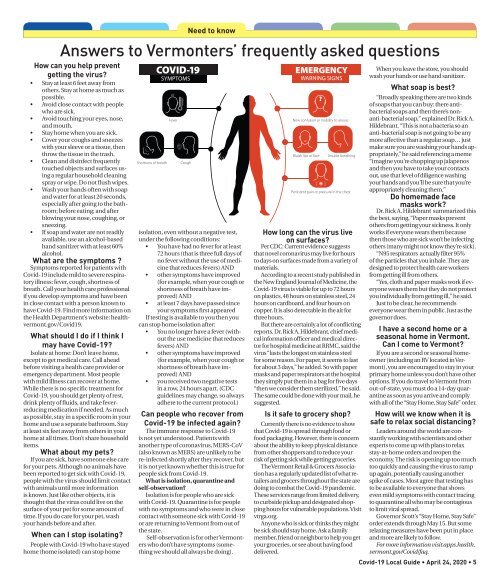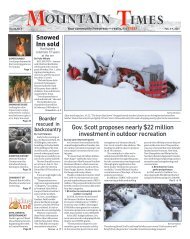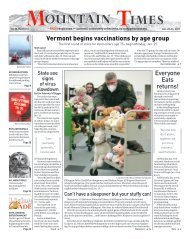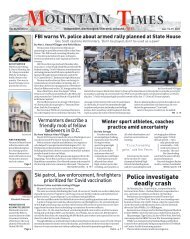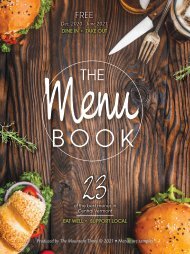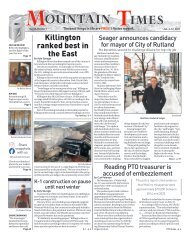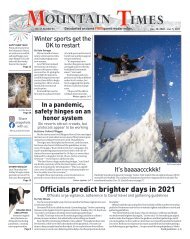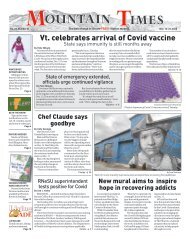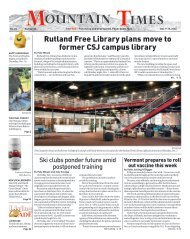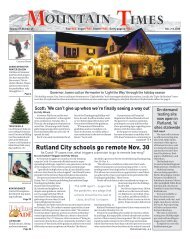COVID-19 Local Resource Guide
You also want an ePaper? Increase the reach of your titles
YUMPU automatically turns print PDFs into web optimized ePapers that Google loves.
How can you help prevent<br />
getting the virus?<br />
• Stay at least 6 feet away from<br />
others. Stay at home as much as<br />
possible.<br />
• Avoid close contact with people<br />
who are sick.<br />
• Avoid touching your eyes, nose,<br />
and mouth.<br />
• Stay home when you are sick.<br />
• Cover your coughs and sneezes<br />
with your sleeve or a tissue, then<br />
throw the tissue in the trash.<br />
• Clean and disinfect frequently<br />
touched objects and surfaces using<br />
a regular household cleaning<br />
spray or wipe. Do not flush wipes.<br />
• Wash your hands often with soap<br />
and water for at least 20 seconds,<br />
especially after going to the bathroom;<br />
before eating; and after<br />
blowing your nose, coughing, or<br />
sneezing.<br />
• If soap and water are not readily<br />
available, use an alcohol-based<br />
hand sanitizer with at least 60%<br />
alcohol.<br />
What are the symptoms ?<br />
Symptoms reported for patients with<br />
Covid-<strong>19</strong> include mild to severe respiratory<br />
illness: fever, cough, shortness of<br />
breath. Call your health care professional<br />
if you develop symptoms and have been<br />
in close contact with a person known to<br />
have Covid-<strong>19</strong>. Find more information on<br />
the Health Department’s website: healthvermont.gov/Covid<strong>19</strong>.<br />
What should I do if I think I<br />
may have Covid-<strong>19</strong>?<br />
Isolate at home: Don’t leave home,<br />
except to get medical care. Call ahead<br />
before visiting a health care provider or<br />
emergency department. Most people<br />
with mild illness can recover at home.<br />
While there is no specific treatment for<br />
Covid-<strong>19</strong>, you should get plenty of rest,<br />
drink plenty of fluids, and take feverreducing<br />
medication if needed. As much<br />
as possible, stay in a specific room in your<br />
home and use a separate bathroom. Stay<br />
at least six feet away from others in your<br />
home at all times. Don’t share household<br />
items.<br />
What about my pets?<br />
If you are sick, have someone else care<br />
for your pets. Although no animals have<br />
been reported to get sick with Covid-<strong>19</strong>,<br />
people with the virus should limit contact<br />
with animals until more information<br />
is known. Just like other objects, it is<br />
thought that the virus could live on the<br />
surface of your pet for some amount of<br />
time. If you do care for your pet, wash<br />
your hands before and after.<br />
When can I stop isolating?<br />
People with Covid-<strong>19</strong> who have stayed<br />
home (home isolated) can stop home<br />
Need to know<br />
Answers to Vermonters’ frequently asked questions<br />
isolation, even without a negative test,<br />
under the following conditions:<br />
• You have had no fever for at least<br />
72 hours (that is three full days of<br />
no fever without the use of medicine<br />
that reduces fevers) AND<br />
• other symptoms have improved<br />
(for example, when your cough or<br />
shortness of breath have improved)<br />
AND<br />
• at least 7 days have passed since<br />
your symptoms first appeared<br />
If testing is available to you then you<br />
can stop home isolation after:<br />
• You no longer have a fever (without<br />
the use medicine that reduces<br />
fevers) AND<br />
• other symptoms have improved<br />
(for example, when your cough or<br />
shortness of breath have improved)<br />
AND<br />
• you received two negative tests<br />
in a row, 24 hours apart. (CDC<br />
guidelines may change, so always<br />
adhere to the current protocol.)<br />
Can people who recover from<br />
Covid-<strong>19</strong> be infected again?<br />
The immune response to Covid-<strong>19</strong><br />
is not yet understood. Patients with<br />
another type of coronavirus, MERS-CoV<br />
(also known as MERS) are unlikely to be<br />
re-infected shortly after they recover, but<br />
it is not yet known whether this is true for<br />
people sick from Covid-<strong>19</strong>.<br />
What is isolation, quarantine and<br />
self-observation?<br />
Isolation is for people who are sick<br />
with Covid-<strong>19</strong>. Quarantine is for people<br />
with no symptoms and who were in close<br />
contact with someone sick with Covid-<strong>19</strong><br />
or are returning to Vermont from out of<br />
the state.<br />
Self-observation is for other Vermonters<br />
who don’t have symptoms (something<br />
we should all always be doing).<br />
How long can the virus live<br />
on surfaces?<br />
Per CDC: Current evidence suggests<br />
that novel coronavirus may live for hours<br />
to days on surfaces made from a variety of<br />
materials.<br />
According to a recent study published in<br />
the New England Journal of Medicine, the<br />
Covid-<strong>19</strong> virus is viable for up to 72 hours<br />
on plastics, 48 hours on stainless steel, 24<br />
hours on cardboard, and four hours on<br />
copper. It is also detectable in the air for<br />
three hours.<br />
But there are certainly a lot of conflicting<br />
reports. Dr. Rick A. Hildebrant, chief medical<br />
information officer and medical director<br />
for hospital medicine at RRMC, said the<br />
virus “lasts the longest on stainless steel<br />
for some reason. For paper, it seems to last<br />
for about 3 days,” he added. So with paper<br />
masks and paper respirators at the hospital<br />
they simply put them in a bag for five days<br />
“then we consider them sterilized,” he said.<br />
The same could be done with your mail, he<br />
suggested.<br />
Is it safe to grocery shop?<br />
Currently there is no evidence to show<br />
that Covid-<strong>19</strong> is spread through food or<br />
food packaging. However, there is concern<br />
about the ability to keep physical distance<br />
from other shoppers and to reduce your<br />
risk of getting sick while getting groceries.<br />
The Vermont Retail & Grocers Association<br />
has a regularly updated list of what retailers<br />
and grocers throughout the state are<br />
doing to combat the Covid-<strong>19</strong> pandemic.<br />
These services range from limited delivery,<br />
to curbside pickup and designated shopping<br />
hours for vulnerable populations. Visit<br />
vtrga.org.<br />
Anyone who is sick or thinks they might<br />
be sick should stay home. Ask a family<br />
member, friend or neighbor to help you get<br />
your groceries, or see about having food<br />
delivered.<br />
When you leave the store, you should<br />
wash your hands or use hand sanitizer.<br />
What soap is best?<br />
“Broadly speaking there are two kinds<br />
of soaps that you can buy: there antibacterial<br />
soaps and then there’s nonanti-bacterial<br />
soap,” explained Dr. Rick A.<br />
Hildebrant. “This is not a bacteria so an<br />
anti-bacterial soap is not going to be any<br />
more affective than a regular soap… just<br />
make sure you are washing your hands appropriately,”<br />
he said referencing a meme<br />
“imagine you’re chopping up jalapenos<br />
and then you have to take your contacts<br />
out, use that level of diligence washing<br />
your hands and you’ll be sure that you’re<br />
appropriately cleaning them.”<br />
Do homemade face<br />
masks work?<br />
Dr. Rick A. Hildebrant summarized this<br />
the best, saying, “Paper masks prevent<br />
others from getting your sickness. It only<br />
works if everyone wears them because<br />
then those who are sick won’t be infecting<br />
others (many might not know they’re sick).<br />
“N95 respirators actually filter 95%<br />
of the particles that you inhale. They are<br />
designed to protect health care workers<br />
from getting ill from others.<br />
“Yes, cloth and paper masks work if everyone<br />
wears them but they do not protect<br />
you individually from getting ill,” he said.<br />
Just to be clear, he recommends<br />
everyone wear them in public. Just as the<br />
governor does.<br />
I have a second home or a<br />
seasonal home in Vermont.<br />
Can I come to Vermont?<br />
If you are a second or seasonal homeowner<br />
(including an RV located in Vermont),<br />
you are encouraged to stay in your<br />
primary home unless you don’t have other<br />
options. If you do travel to Vermont from<br />
out-of-state, you must do a 14-day quarantine<br />
as soon as you arrive and comply<br />
with all of the “Stay Home, Stay Safe” order.<br />
How will we know when it is<br />
safe to relax social distancing?<br />
Leaders around the world are constantly<br />
working with scientists and other<br />
experts to come up with plans to relax<br />
stay-at-home orders and reopen the<br />
economy. The risk is opening up too much<br />
too quickly and causing the virus to ramp<br />
up again, potentially causing another<br />
spike of cases. Most agree that testing has<br />
to be available to everyone that shows<br />
even mild symptoms with contact tracing<br />
to quarantine all who may be contagious<br />
to limit viral spread.<br />
Governor Scott’s “Stay Home, Stay Safe”<br />
order extends through May 15. But some<br />
relaxing measures have been put in place<br />
and more are likely to follow.<br />
For more information visit apps.health.<br />
vermont.gov/Covid/faq.<br />
Covid-<strong>19</strong> <strong>Local</strong> <strong>Guide</strong> • April 24, 2020 • 5


